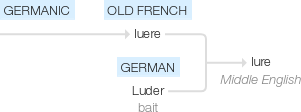Lure
Middle English: from Old French luere, of Germanic origin; probably related to German Luder ‘bait’.
wiktionary
From Anglo-Norman lure, from Old French loirre (Modern French leurre), from Frankish *lōþr, from Proto-Germanic *lōþr-. Compare English allure, from Old French.
Borrowed from Icelandic lúðr
etymonline
lure (n.)
early 14c., "something which allures or entices, an attraction" (a figurative use), originally the name of a device for recalling a hawk, from Anglo-French lure, Old French loirre "device used to recall hawks, lure," from Frankish *lothr or some other Germanic source, from Proto-Germanic *lothran "to call" (source also of Middle High German luoder, Middle Low German loder "lure, bait," German Luder "lure, deceit, bait;" also Old English laþian "to call, invite," German laden "invite, summon").
The original lure was a bunch of feathers, arranged so as to resemble a bird, on a long cord, from which the hawk was fed during its training. Used of means of alluring other animals (especially fish) from c. 1700. Technically, bait (n.) is something the animal could eat; lure is a more general term. Also in 15c. a collective word for a group of young women (as a c. 1400 document has it, "A lure of ffaukones & damezelez").
lure (v.)
late 14c., "attract (a hawk) by casting a lure or decoy," also of persons, "to allure, entice, tempt," from lure (n.). Related: Lured; luring; lurement.
